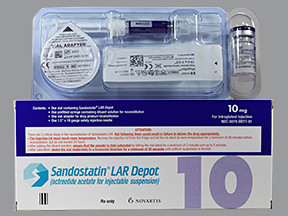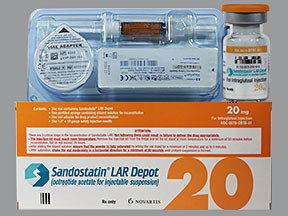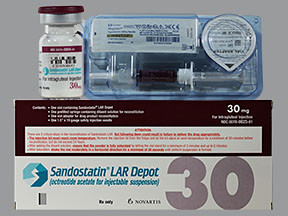OCTREOTIDE DEPOT SUSPENSION - INJECTION
PHONETIC PRONUNCIATION: (ok-TREE-oh-tide)
COMMON BRAND NAME(S): Sandostatin LAR
GENERIC NAME(S): octreotide acetate, microspheres
Uses
USES: This medication is a long-acting form of octreotide. Octreotide is used to treat severe watery diarrhea and sudden reddening of the face and neck caused by certain types of tumors (e.g., carcinoid tumors, vasoactive intestinal peptide tumors) that are found usually in the intestines and pancreas. The symptoms occur when these tumors make too much of certain natural substances (hormones). This medication works by blocking the production of these hormones. By decreasing watery diarrhea, octreotide helps to reduce the loss of body fluids and minerals. Octreotide is also used to treat a certain condition (acromegaly) that occurs when the body makes too much of a certain natural substance called growth hormone. Treating acromegaly helps reduce the risk of serious problems such as diabetes and heart disease. Octreotide works by decreasing the amount of growth hormone to normal levels. This drug is not a cure for these conditions. This medication is usually used with other treatment (e.g., surgery, radiation, other drugs).
How to use OCTREOTIDE DEPOT SUSPENSION - INJECTION
HOW TO USE: You must respond well to the short-acting form of octreotide before switching to this medication. Consult your doctor or pharmacist. This medication is given by injection into your buttock muscle as directed by your doctor, usually once every 4 weeks. Dosage is based on your medical condition and response to treatment. To reduce irritation, change the location of the injection site in the buttocks with each dose. Avoid giving this medication into the muscles of the arm. Doing so causes more pain and irritation. If you are giving this medication to yourself at home, learn all preparation and usage instructions from your health care professional. Before using, check this product visually for particles or discoloration. If either is present, do not use the liquid. Learn how to store and discard medical supplies safely. Take this medication out of the refrigerator 30 to 60 minutes before mixing. Use this medication regularly to get the most benefit from it. It may help to mark your calendar with a reminder (such as every 4 weeks). Tell your doctor if your condition does not improve or if it worsens.
Side Effects
Precautions
Interactions
Overdose
Images
Reviews
Faq for OCTREOTIDE DEPOT SUSPENSION - INJECTION
Octreotide Depot Suspension - Injection is used for the long-term treatment of certain types of tumors, including carcinoid tumors, acromegaly, and vasoactive intestinal peptide-secreting tumors. It helps reduce the production of certain hormones in the body.
Octreotide Depot Suspension - Injection belongs to a class of medications called somatostatin analogs. It works by binding to certain receptors in the body, inhibiting the release of various hormones, such as growth hormone, insulin, and glucagon. This helps in controlling the symptoms associated with the different types of tumors.
Octreotide Depot Suspension - Injection is administered through a deep intramuscular injection. It is usually given once every 4 weeks by a healthcare professional.
Common side effects of Octreotide Depot Suspension - Injection may include pain or redness at the injection site, diarrhea, abdominal pain, nausea, vomiting, and gallstones. Contact your doctor if these side effects persist or worsen.
Octreotide Depot Suspension - Injection should be used during pregnancy only if clearly needed, as its safety has not been well-established in pregnant women. It is also not recommended to use Octreotide Depot Suspension - Injection while breastfeeding, as it may pass into breast milk.
If you miss a dose of Octreotide Depot Suspension - Injection, contact your healthcare provider as soon as possible to reschedule the missed dose. Do not double the dose to make up for a missed one.
Octreotide Depot Suspension - Injection may interact with certain medications, including insulin, antidiabetic drugs, cyclosporine, and certain vitamins and minerals. Inform your doctor about all the medications you are currently taking to avoid any potential interactions.
The full effects of Octreotide Depot Suspension - Injection may not be seen for several weeks or months. It is important to continue the treatment as prescribed by your doctor, even if you do not notice immediate improvement in symptoms.
Octreotide Depot Suspension - Injection has been approved for use in pediatric patients based on specific indications. The dosage and administration should be determined by a healthcare professional based on the individual patient's needs.
Disclaimer
IMPORTANT: HOW TO USE THIS INFORMATION: This is a summary and does NOT have all possible information about this product. This information does not assure that this product is safe, effective, or appropriate for you. This information is not individual medical advice and does not substitute for the advice of your health care professional. Always ask your health care professional for complete information about this product and your specific health needs.



No Reviews Yet